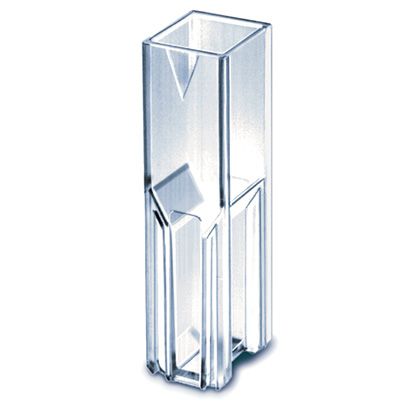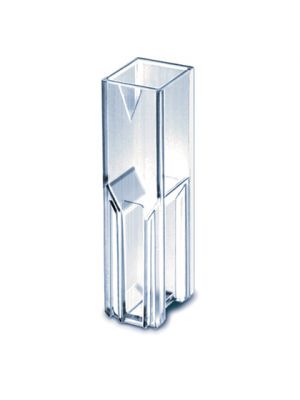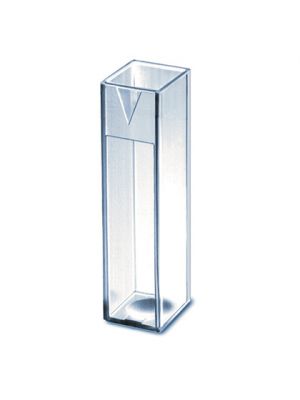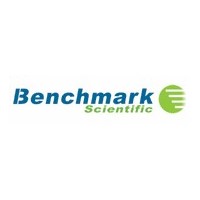UV Cuvettes
UV-transparent, disposable cuvettes from BRAND replace expensive, fragile quartz cuvettes and are excellent for DNA, RNA, and protein analyses between 230-900nm. See transmission curves on page 101. Made from a proprietary polycyclical olefin, they are resistant to many aggressive solvents and eliminate the tedious maintenance, cleaning, and contamination risk of quartz cuvettes. Additionally, they fit most commercial spectrophotometers and photometers without requiring the use of special adapters.
Features:
- Eliminate the hassles of quartz cuvettes: Eliminate the washing, cross-contamination, breakage and expense associated with fragile quartz cuvettes.
- Allow smaller sample sizes: In addition to macro and semi-micro sizes that require 2.5mL and 1.5mL of sample volume, respectively, BRAND UV-Cuvettes are available in ultra-micro sizes that require only 70µL of sample volume.
- Ultra-micro cuvettes are available individually-wrapped: Independently-certified DNA-, DNase-, RNase-free for an extra degree of sample protection.
- Resist most chemicals: Cuvettes may be used with most polar organic solvents, as well as a broad range of acids and bases. They have much greater chemical resistance than PS or PMMA cuvettes and are compatible with chemicals such as acetone, butanone, DMF, and concentrated hydrochloric acid.
- Perform consistently: Cuvettes are manufactured from scratch- resistant materials, and are grouped by manufacturing mold cavity number to ensure the lowest variation in extinction coefficient.
- Manufactured by BRAND: BRAND is one of the world’s largest cuvette manufacturers. Nearly thirty years of experience producing quality cuvettes is your assurance of reliability
Two window heights to fit most spectrophotometers
To reduce the sample size required by BRAND’s ultra-micro sized UV-Cuvettes, the floor of the sample chamber is elevated to just below the light path. As there is not a single standard for light beam height, BRAND offers ultramicro cuvettes with two different z-dimensions, to help you conserve your sample. Not sure of the beam height of your instrument?

For help selecting Ultra-Micro Cuvettes for your spectrophotometer –
Frequently Asked Questions:
What is the light path of the BRAND cuvettes? All BRAND cuvettes have a light path of 10mm.
What is the difference between your PS, PMMA and UV-Cuvettes? Polystyrene (PS) cuvettes are the least expensive, however they have the lowest chemical resistance, and are only suitable for visible light applications, with a lower wavelength limit of around 340nm. Polymethyl methacrylate (PMMA or "acrylic") cuvettes extend that range to about 300nm, or slightly into the near UV range, and have slightly greater chemical compatibility. BRAND UV-Cuvettes use a proprietary plastic to allow measurement as low as 230nm, and has resistance to many polar organics as well as many acids and bases.
What does "mold cavity matched" mean? Cuvettes are injection molded plastic. No matter how close the tolerances are in the molds, there will be some variance. BRAND cuvettes are sorted during the manufacturing process so that each package of cuvettes contains only cuvettes made from the same mold, minimizing the cuvette-to-cuvette variance.
What is the maximum temperature the UV cuvettes can tolerate? The UV cuvettes should not be used above 70°C.
Do you offer sterile UV-Cuvettes? / Can the UV-Cuvettes and caps be autoclaved? Ultra-micro UV-Cuvettes are offered individually wrapped, DNA-, DNase-, RNase-free. However, because they have not undergone a sterilization procedure, they can not be called sterile. This is true of all disposable UV-transparent cuvettes on the market - none of them have undergone a sterilization procedure. The UV-cuvettes cannot be autoclaved. Autoclaving destroys the optical properties of the UV-Cuvettes. The caps are made of polyethylene, and as such can not be autoclaved. They are, however, manufactured under clean room conditions.
My results with your UV-Cuvettes are different than with quartz. What's happening? While our UV-Cuvettes allow enough light to pass to perform accurate spectrophotometry down to 220nm, they are not as transparent as quartz. When using UV-Cuvettes, any reference measurements should also be done with UV-Cuvettes.
I have selected the correct size UV-Cuvettes for my spectrophotometer, but still am not getting appropriate results. Why? If you are using the appropriate window height (z-dimension) ultra-micro UV-Cuvette for your spectrophotometer, and are not getting appropriate results, it is likely due to one of two different problems.
- Extremely dilute samples: Because the proprietary plastic has a higher absorbance than quartz, extremely dilute samples may not differ substantially from background, so you may have no other choice than to use a quartz cuvette.
- Light beam width: Some spectrophotomers have abnormally wide light beams that can be refracted by the side walls of the cuvette. When using ultra-micro sized samples, these spectrophotometers require the use of black-masked quartz cuvettes to overcome this deficiency.
Technical Specifications:
| Material | Filling Vol. | Window | Light | Pack of | Cat. No. | Semi-Macro | |
| Min. | Max. | Dimensions, mm | Path, mm | Range of Application UV | |||
| UV Semi-Micro | 1.5 | 3.0 | 4.5 x 23 | 10 | 500 | 759165 | 230-900nm |
Plastic Cuvette Chemical Compatibility Chart:
| Chemical | PS | PMMA | UV |
| Acetic acid (96%) | Poor | Poor | Excellent |
| Acetone | Poor | Poor | Excellent |
| Acetonitrile | Poor | Poor | Excellent |
| Benzene | Poor | Poor | Poor |
| Butanone (methyl ethyl ketone, MEK) | Poor | Poor | Excellent |
| Carbon Tetrachloride | Poor | Poor | Poor |
| Chloroform | Poor | Poor | Poor |
| Diethy Ether | Poor | Poor | Marginal |
| Dimethyl Sulfoxide | Marginal | Poor | Excellent |
| Ethanol | Poor | Poor | Excellent |
| Formaldehye (40%) | Poor | Poor | Excellent |
| Heptane | Poor | Marginal | Poor |
| Hexane | Poor | Excellent | Poor |
| Hydrochloric Acid (32%) | Marginal | Poor | Excellent |
| Isopropanol | Marginal | Marginal | Excellent |
| n-Pentane | Poor | Poor | Poor |
| Oleic Acid | Poor | Poor | Poor |
| Perchloric Acid (10%) | Poor | Poor | Excellent |
| Petroleum Ether | Poor | Poor | Marginal |
| Phenol | Poor | Poor | Excellent |
| Sodium Hydroxide | Excellent | Poor | Excellent |
| Sulfuric Acid | Poor | Poor | Excellent |
| Trichloroacetic Acid | Poor | Poor | Excellent |
| Trichloroethylene | Poor | Poor | Poor |
| Toluene | Poor | Poor | Poor |
| Technical Specifications |
|
|||||||||||||||||||||
|---|---|---|---|---|---|---|---|---|---|---|---|---|---|---|---|---|---|---|---|---|---|---|


















